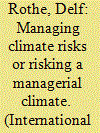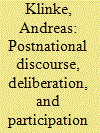|
|
|
Sort Order |
|
|
|
Items / Page
|
|
|
|
|
|
|
| Srl | Item |
| 1 |
ID:
108059


|
|
|
|
|
| Publication |
2011.
|
| Summary/Abstract |
Current international climate governance from a risk-political perspective points to a paradoxical moment in world risk society. While the probability of negative climate impacts increases and we can see the emergence of a common risk perception among international decision-makers, nation states in the international climate regime fail to agree on effective preventive measures that could mitigate the harming effects of global warming. While at the discursive level climate change is constructed as one of the major risks in the twenty-first century, the focus in international climate governance remains on voluntary measures and market-based instruments. Drawing on discourse theory, this paradox can be explained as the outcome of a discursive struggle in climate politics. Risk, in this perspective, is a political technology to govern the future that is embedded within broader political rationalities. Until 2007, risk management in climate governance was established as a form of advanced liberal government based on individualisation and self-responsibility. The growing consensus on dangerous climate change ultimately reinforces this advanced liberal risk management by presenting climate change as a 'naturalised' de-bounded risk and blurring its socio-economic causes.
|
|
|
|
|
|
|
|
|
|
|
|
|
|
|
|
| 2 |
ID:
131706


|
|
|
|
|
| Publication |
2014.
|
| Summary/Abstract |
An emerging task in world politics is to cope with human-induced global risks in domains such as environment, economy, security, and health. Current global governance institutions are largely incapable of tackling global risks and applying deductive policy models, which is why new modes of interaction may become essential. In this article I argue that through focused discourses, key peculiarities of global risks, namely complexity, scientific uncertainty and sociopolitical ambiguity, may be identified and understood. To this end, distinctively discursive and pragmatic learning processes can be developed. Different forms of deliberation and participation help develop processes that meet the challenges, problems, and conflicts that result from the key peculiarities of global risks. Hence, the article establishes a causal link between key peculiarities of global risks and postnational discourses. I discuss the varying forms of deliberation and participation (epistemic institutions, associational policy making, and transnational public deliberation and participation) of three discourses that produce institutional problem solving capacity in global risk governance. To this end, this article links theory and practice as well as normative conceptualisation and institutional feasibility.
|
|
|
|
|
|
|
|
|
|
|
|
|
|
|
|
|
|
|
|
|